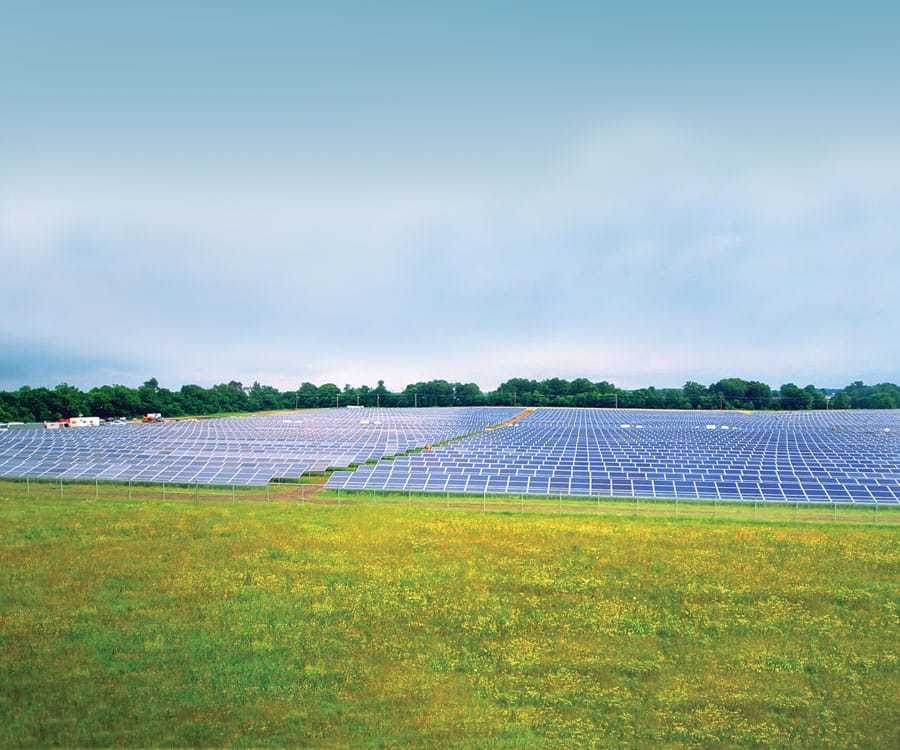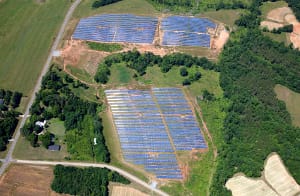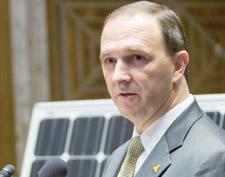Sunny forecast: Cleveland County and N.C. high on solar energy lists
Sunny forecast: Cleveland County and N.C. high on solar energy lists
There’s a silent engine that is almost constantly churning in Kings Mountain. Two vast solar farms that together encompass about 60 acres are helping put Cleveland County at the top of the list of N.C. counties investing in solar energy in the last several years.
Cleveland County ranks 7th among North Carolina’s 100 counties for solar energy investment since 2007, according to the North Carolina Sustainable Energy Association. The county’s part equates to $58.3 million.
Neighboring Gaston County isn’t far behind, ranking 16th on the list and drumming up more $30 million in new investments in the same time period. The rural Robeson County, in the southeastern part of the state, and Davidson County, which sits about 50 miles northeast of Mecklenburg County, top the list at the No. 1 and No. 2, respectively. Catawba County is third with nearly $129 million in investments in that segment of the renewable energy business.
The Tar Heel State in general can brag a little, too. It was listed number one in growth in solar energy investments in 2013, leapfrogging from 20th place just 10 years ago. California is the country’s top solar energy producer. In overall business, North Carolina ranks about 10th overall.
Industry insiders credit a couple of main reasons for the bloom in solar power in the state.
One is political: The N.C. legislature started providing tax credits in 2002. Another reason has to do with the slackening in the number of tobacco farms in the central and eastern N.C., which have freed up property owners to look at other options.
Another big reason why solar power plants are attracted to North Carolina has to do with the climate here. In short, it’s a sunny state that isn’t too hot. (Energy production from solar panels falls off slightly in extreme heat, such as the kind of desert heat that visits many western states like Arizona and New Mexico).
Kings Mountain’s largest solar farm is located on Dixon Dairy Farm Rd., a few miles southwest of downtown. Built in 2011 and operated by Strata Solar, a Chapel Hill-based company, it covers 37 acres. The site is unmanned. Instead, Strata Solar employees a roving crew of workers who tend to its properties throughout the year, trimming vegetation, cutting grass and making repairs as needed.
In North Carolina and the nation, solar power is one of the most growing businesses in the last 30 years, according to Blair Schooff, Strata Solar’s Vice President of Sales and Marketing. His company and others like it have been busy building not just farms, which sell energy to utilities, but also packing the roofs of major retailers like Wal-Mart and Lowe’s with panels that the stores use to cut their own power bills.
Solar power, which dates back to the late 19th century and enjoyed a boom in the U.S. in the 1970s, has become a brighter option for large companies, homeowners and power companies as the price of coal and oil have steadily increased. In the last 10 or 15 years, the rise in solar power has also been helped by falling prices in solar equipment.
Schooff said that Strata Solar, which employs about 150 people, does business in seven states, including Georgia, Tennessee, Virginia and Tennessee, but it is most focused right now on its home state.
“North Carolina is our bread and butter,” he said, adding that the company is currently developing another site on Long Branch Rd., south of town near Grover. That site, like the one at Dixon Dairy Rd., will contract with Duke Energy to provide the utility giant with power. The City of Kings Mountain, an energy co-op, is a Duke Energy customer that then retails the power to its own customers.
The Charlotte-based Entropy Solar Integrators operates the second largest solar power farm in Kings Mountain. Encompassing about 22 acres, its farm lies just off of Hwy. 161 past the I-85 interchange. Built in 2010, it also contracts with Duke Energy. Both farms employ fixed panels, meaning they don’t swivel or rotate to track the sun’s most direct rays.
What makes a locale feasible for a solar farm?
“Topography dictates panel density on any given site,” said Strata Solar’s Schooff, adding that companies like his don’t grade the land. Open pastures with no trees are ideal.
The equipment – typically just rows and rows of solar panels – are then posted into the ground and cement foundations are generally not used.
“We don’t grade and we don’t add implements (foundations or other buildings),” he said in a recent interview. “When we leave, we leave nothing behind.”
Contracts with landowners usually are for 15 years at a minimum, said Schooff, and land lease rates fluctuate a lot from region to region and declined to give a range of figures that solar companies pay per acre of land use.
via Sunny forecast: Cleveland County and N.C. high on solar energy lists.



